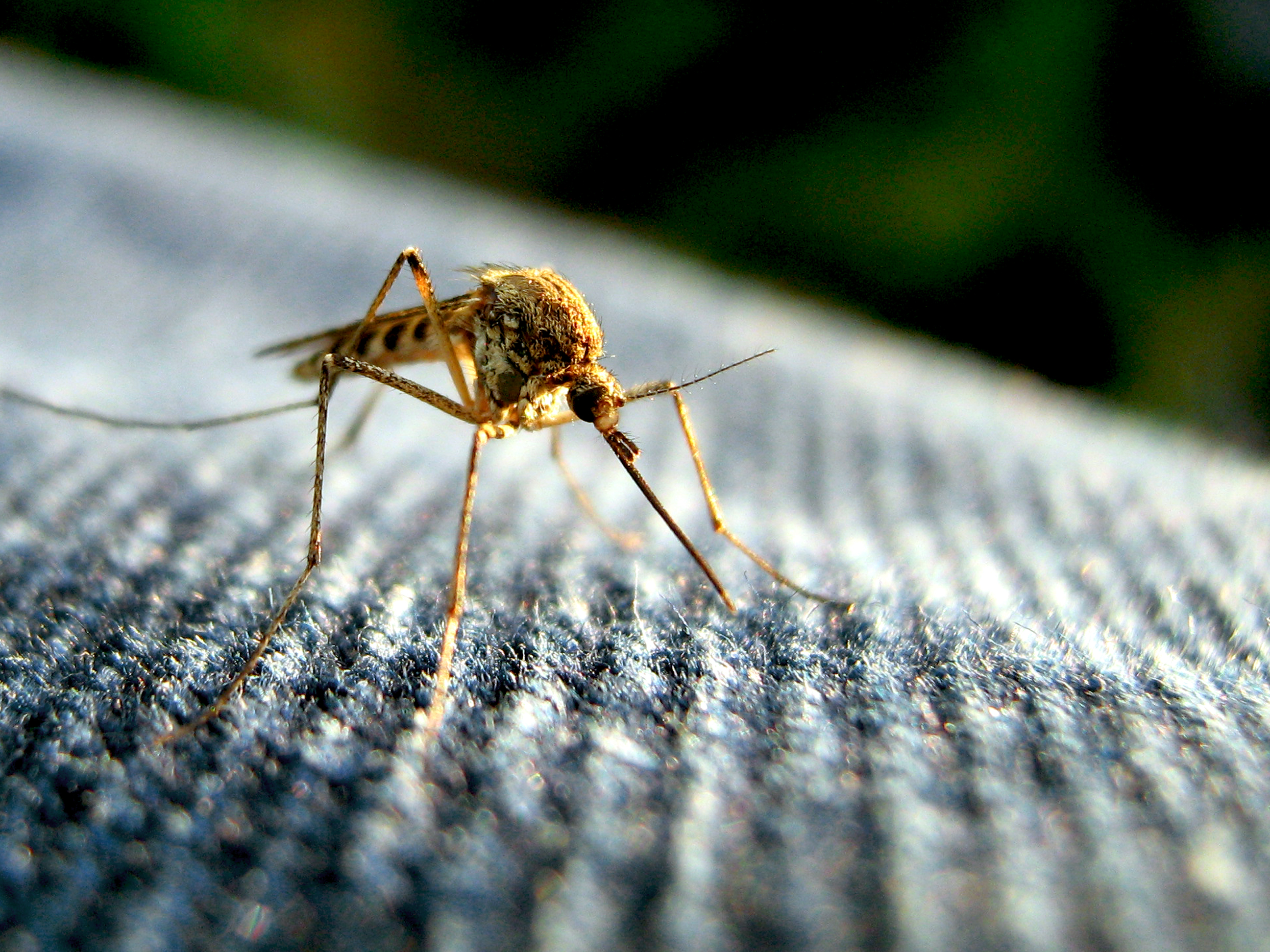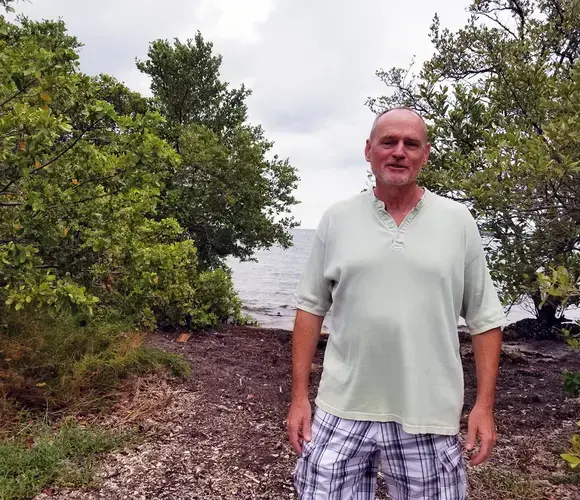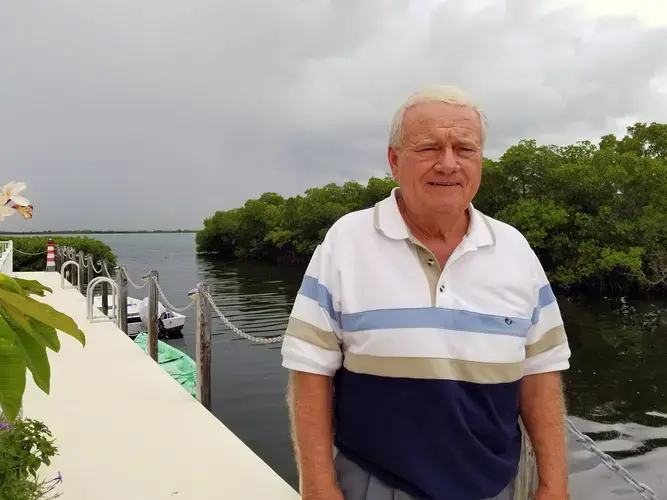
KEY WEST, Fla. – The crowd at the Monroe County town hall meeting was not intimidated by the panel of experts arrayed on the stage before them.
It was a Thursday evening in December 2014, in the middle of a debate that had already stretched on for years, intensifying along the way. Panelists spoke, the crowd laughed and booed. Sometimes, those on stage grimaced in response.
There were over 60 residents in the audience – many senior citizens, some parents with children in tow. The subject stirring the emotions was not tax increases or failing schools, not crime or gun control.
It was mosquitoes.
Not just any mosquitoes. The topic was a proposal to launch the first trial of genetically-engineered mosquitoes in U.S. history. The idea was to use them to control a mosquito species that carries deadly tropical diseases – yellow fever, dengue, chikungunya, Zika.
Derric Nimmo, a principal scientist at the biotechnology company Oxitec, was in town from England and sat at the center of the panel. The company was slated to run a trial in partnership with the local mosquito control district, in a county well acquainted with mosquito-borne diseases.
On Key West, the victims of waves of yellow fever from the late 1800s are buried in the vast cemetery. Nearby, the names of Union soldiers who died from the disease decades earlier are etched on a limestone monument.
It was clear almost immediately that Nimmo and his colleagues were not salesmen, based on a review of a video of the two-and-a-half hour meeting. When Nimmo said it would be premature to say with certainty that the modified-mosquitoes would stop disease, the statement was met with laughter.
Still, the public’s questions hinted at the same legal, scientific and moral issues researchers and developers had wrestled with as they developed the plan. With each question, the crowd revealed the uncertainties – and wariness – that comes with new science.
Their primary concern centered around the inevitable release of biting female mosquitoes, which opponents feared would harm humans and the environment.

“We are not objecting because we are afraid,” Barry Wray, executive director of the Florida Keys Environmental Coalition, said in August. “We are objecting because the answers are not qualified to the level they needed to be for us to feel that you’ve proven the safety.”
The long-running debate in the Keys over genetically-modified mosquitoes, one that goes to the question of how much humans should meddle with the natural world, will soon get a broader airing. In March, officials in Harris County, Texas, began negotiations for its own mosquito-control trial. Similar sterile-insect technologies are being in considered by several cities, and other Oxitec insects have been tested in New York and Arizona.
In the Florida Keys, a referendum fight last year took on all the trappings of a modern-day political campaign – radio ads and zealous canvassers, slogans and, yes, misleading attacks.
Seven years after Oxitec first arrived in Florida, the company still awaits a trial, and an answer to the question: Can scientific data trump political scare tactics?
“It was an experiment,” said Meagan Hull, a resident opposed to the trial and all genetically-modified organisms. “They came right out and said this was an experiment. We don’t want to be experimented on.”
'Herculean efforts'
Florida was in a deadly battle with mosquitoes long before health officials realized it.
In 1887 and 1888, yellow fever outbreaks sent residents fleeing from cities across the state. In Jacksonville, large piles of pinewood were burned in the streets to “purify” the air of fever pathogens. It wasn’t until century’s end that scientists discovered mosquitoes were the culprits.
Over the following decades, the state built a massive mosquito control infrastructure, creating 61 programs, each tasked with fighting the 80 species that call the state home.
In 2009 and 2010, a battle with dengue underscored the need for new solutions.
Dengue is known as “breakbone fever” and the moniker fits – symptoms include extreme pain, body aches, fever, chills and easy bruising. An estimated 390 million infections are estimated worldwide each year, according to the World Health Organization. There is no cure.
It was spread by Aedes aegypti, an urban mosquito that can breed virtually anywhere it finds water. It is one of 13 species in Florida that transmit diseases. Only females bite, seeking nutrients from blood. Those bites can transmit diseases from one person to another.
The outbreak consumed the mosquito control district.
The district’s field inspectors, dozens of them, scoured the county each day for sources of standing water. They sprayed pesticides and spoke with residents about the risks. Helicopters hummed overhead, chemicals fell from the air.
“The Florida Keys Mosquito Control District was doing everything they could to control Aedes aegypti and they were desperate, because everything they were throwing at it wasn’t really working, wasn’t really reducing the population,” Oxitec’s Nimmo said in an interview. “And the Florida Keys Mosquito Control District is considered one of the best in the world.”
The dengue outbreak infected 93 in Key West alone. Since then, the Keys have only seen one case of a disease caught from local Aedes aegypti, according to Andrea Leal, the district’s executive director.
That’s because the battle never stopped.
The district spends $1.1 million a year fighting Aedes aegypti in the Key West area alone, but it’s not enough. Current control techniques can cut the population in half. To stop the spread of disease, experts say 90% must be killed – a figure Oxitec achieved in trials in Panama, the Cayman Islands and Brazil.

“The Aedes aegypti is by far our enemy number one here,” said Phil Goodman, chairman of the district’s board of commissioners. “It’s really a Herculean effort that we do combining a lot of different things to kill them.”
But the aerial pesticides being used require almost pristine weather, and the mosquitoes are adapting to survive the chemical assault.
The district first turned to Oxitec and its genetically modified mosquitoes in 2010. When that stalled amid public concerns and the federal review process, it tried a company called MosquitoMate, which infects lab-reared Aedes aegypti with a bacteria that makes them sterile. Those male mosquitoes compete with others, and every time they win it helps reduce the population.
That approach is seen as more natural, and generated little controversy. Only three residents and a reporter attended the district’s meeting to discuss the MosquitoMate trial, officials recalled.
A MosquitoMate trial was held over five months this past summer. It ended before Hurricane Irma hit. The results are not yet known, but the district is weighing a second effort next year when mosquito season ramps up again.
“We’re certainly hopeful it works,” Goodman said. “We’re a little disappointed that so far it hasn’t shown anything, but we’re still really interested in it because the technology makes sense.”
In comparison, the Oxitec approach feels like science fiction.
The company’s strain of Aedes aegypti, officially known as OX513A, is engineered to have two genes inserted into its DNA: one makes the insects glow, the other makes them self destruct.
The fluorescent gene verifies that the gene modification was successful and helps researchers track them in the wild. The lethal gene kills the mosquito in two to three days.
That is enough time time for a male to mate and spread the genes to its offspring, killing the larvae before they can fully develop.
“I’m convinced that this technology is really needed in this industry,” said Goodman, who is a retired chemist. “Because we are going to be dealing with these diseases for years to come, and coming out of the chemical industry, I can tell you there’s nothing on the chemical side that’s being developed for this.
“Mosquitoes killing mosquitoes is the way to go.”
Some in the Keys were less convinced.
'Jurassic Park' mosquitoes
Faced with the perennial opposition to using genetically modified mosquitos, officials agreed in June 2016 to let residents vote on the matter. It was a non-binding referendum, meaning the vote would help assess public opinion, not decide if the trial would go forward.
The final decision would be left to mosquito control officials, pending a safety review by the U.S. Food and Drug Administration, with input from the U.S. Centers for Disease Control and Prevention and the Environmental Protection Agency.
The vote was split, to get a total for the county, but also an individual vote for Key Haven, Oxitec’s chosen trial site.
It would be, by all accounts, the first referendum on any genetically-modified organism in the world.
Political action committees were formed, with canvassers for both sides going door to door. On social media, word-battles sometimes escalated into threats. Protesters arrived at meetings with signs and stickers asserting “females will be released.” Lawn signs declared “NO CONSENT” with pictures of crossed out mosquitoes. Others depicted Oxitec’s Aedes as a red-eyed cartoon, a tongue protruding rabidly as blood dripped from its straw-like stinger.
Nimmo went on radio shows to defend the mosquitoes’ safety. On the company’s website, and a site for the mosquito control district, pages for Frequently Asked Questions grew longer and more detailed by the week.
Even pop culture mattered.
The “Jurassic Park” movie series – which began in 1993 with a fictional scientist using blood from a prehistoric mosquito to resurrect dinosaurs that attacked the humans – added to the chaos of the Oxitec debate, Goodman recalled. The most recent film, “Jurassic World,” released in June 2015, had captivated the nation, becoming the fourth highest-grossing film of all time.
Some of the movies were running marathon-style on TV, and Goodman began to notice concerns from residents that the technology could spiral out of control.
“It was literally like an upside down world down here,” said Quincy Perkins, a resident of Key West who supports the trial. “And it got political super fast. It was completely backwards – I would see people saying things like, ‘How dare Trump and his climate change deniers blah blah blah,’ and then the next post on Facebook was like, ’How can we trust the CDC?’ ”
While the plan called for the release of only males, accusations arose that Oxitec was downplaying the chance a female could be released. And what would happen if it bit someone? This idea was pushed by opponents, even though extensive research showed a bite would pose near-to-no risk for humans.
“It was made with herpes and E. coli. Let’s just start there,” Mara Daly, an Islamadora resident with one son said in an interview. “So as a mother and not being scientific, I hear those two words and ‘why are you using human diseases and insects with bad stuff? Even if they can’t transmit it to us?’ ”
The lethal gene in an Oxitec mosquito does come from a lab strain of E. coli. Indeed, the mosquito also has a DNA sequence from herpes simplex 1, which naturally infects 50-80% of U.S. adults, and another from coral (as in the ocean) – all of which verified as unlikely to harm humans.
Nimmo said in the five years Oxitec has been releasing, there have been no reports of any negative effect on humans.
As a line producer for National Geographic, Perkins had seen children in hospitals in Ecuador screaming in pain from dengue infections until they fainted. Back home, he watched the debate swirl into election-year rhetoric.
“There were so many times where I heard things like ‘alternative facts,’” he said. “I’d share these peer-reviewed studies and I’d hear the same vocabulary being used against me.”
He was one of a few residents to publicly back the trial. Despite harassment from opponents on Facebook, he couldn’t back down.
“I just really felt like I was letting those kids down,” he said. “I felt like if I was silent, I was just letting those kids scream in that hospital.”
Some residents felt as if they were guinea pigs, the technology being crammed down their throat.
“We have this kind of arrogance as scientists that once the findings will speak for themselves, then everything will change,” said James Lavery, the Hilton chair in global health ethics at Emory University.
“I always say that stories trump data and relationships trump stories,” he said. “Scientists just sort of believe that their data should prevail at all times because it’s science, but we know from policy that that’s just not the way it works.”
On election day, all eyes were on the tiny island neighborhood of Key Haven, the planned site for the trial. Near the end of the Keys’ main road, Key Haven is isolated from the bustle of tourist-filled Key West five miles away.
Other than a small gas station, the island is entirely residential, attracting everyone from young families living in ranch homes to retiree couples in mansions.
The measure passed, 58% to 42%, at the county level. Key Haven residents voted 65% to 35% against the trial.
Shortly after, the mosquito control board of commissioners approved the trial, pending the EPA’s approval for a new location since Key Haven had voted no.
“There was just all this negativity focused on this little community,” said Goodman, chair of the district’s board of commissioners. “It was fear mongering to the worst degree and really out-and-out lies, some of the things they said.”
Nearly a year after the referendum, opposition and confusion in Key Haven remain.
“I just don’t know if sending out little ‘Jurassic Park’ mosquitoes – science sometimes, you know, I don’t always trust it,” said Dennis Piscopink, who has lived in Key Haven for seven years. “They make mistakes.”

Roberta Spencer, 64, said she voted against the trial because she didn’t “feel like the science was proven enough.”
She said the mosquito control district should instead put more “boots on the ground,” meaning more field inspectors, such as those that contained the dengue outbreak.
Mark Rivas, 51, lives on one of the Key Haven streets where the mosquitoes were to be released. He refused to say how he voted, but with his front door cracked open, he only had one thing to say.
There were a lot of people who did not understand the technology, or why it was necessary, he said.
“The PR from Oxitec and mosquito control was terrible.”
Not in my backyard
In August, Cinnamon Bloss, a researcher at the University of California, San Diego, broke down the opposition to the Oxitec trial in the Journal for the American Medical Association, analyzing the 2,624 public comments provided to the FDA during its review.
She found 75% of the comments opposed the trial. Of those, 49% cited concerns about ecological safety, 61% discussed human health, 68% genetically-modified organisms, and 30% mistrust of the government or industry.
Bloss cautioned that the comments are from the people most invested in the decision, but said the number who expressed distrust of government was significant.
“I think in the public health world, most people who work in that realm will say that you really can’t have successful public health intervention without public trust and public confidence in public health workers,” she said.
Mila de Mier, a Keys resident for more than 20 years, is the public face of the opposition today.
The mother of three made national news with her petition against the trial, which currently has more than 170,000 signatures at change.org, almost double the population of Monroe County.
De Mier says she is not against all genetically-modified organisms.
“I would have been the first person to do it if we have people who are sick,” de Mier said. “If we had dengue, Zika, or whatever.”
In any case, the referendum result on the county level means the Oxitec trial will go on somewhere in Monroe County. A specific location has not been selected, and there is no clear timeframe without the EPA’s approval.
“The world was looking at what we were doing,” said Perkins, the supporter. “How scary was that? The world was looking down. So for all those reasons – you know people ask me, ‘why did you even get involved?’ That’s kinda why.
“Because this became a lot scarier than Key Haven.”











